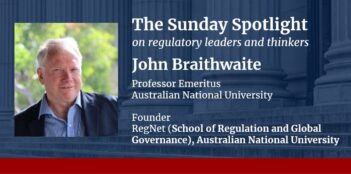
Scholars argue changing global attitudes and U.S. legal culture have impacted white-collar prosecutions.
American corporate anti-bribery and anti-corruption laws form the basis for one of the largest and busiest fields of white-collar legal practice in the world. Other countries have even developed their own enforcement mechanisms in response to the increasing importance of American anticorruption laws. But prior to 2000, enforcement of U.S. anti-corruption laws rarely occurred. What prompted this dramatic and rapid change?
According to Duke Law professors Rachel Brewster and Samuel W. Buell, greater international cooperation combined with U.S. legal culture spurred this growth in anti-corruption enforcement. In a recent article, they argue that a better understanding of the effects of corruption prompted countries to support U.S. anti-corruption enforcement efforts and gave U.S. prosecutors access to evidence located abroad, which improved their ability to investigate and bring cases against both American and foreign corporations. In addition, U.S. legal culture rewards prosecutors for handling anti-corruption cases, and a symbiotic relationship between prosecutors and corporate defense attorneys formed over time. Brewster and Buell suggest that, due to these factors, anti-corruption enforcement will continue to grow in importance.
The main U.S. anti-corruption law – the Foreign Corrupt Practices Act (FCPA) – always allowed prosecutors to target both U.S. and foreign companies that bribed foreign government officials. But, as Brewster and Buell note, since evidence of illegal bribes was often located overseas, U.S. prosecutors needed the help of local authorities to collect this evidence. And many governments refused to aid U.S. anti-corruption enforcement efforts. Indeed, the prevailing theory held that bribery actually benefited developing countries by facilitating investment, and some countries even considered bribes a tax-deductible business expense.
New research that emerged in the 1990s changed these perceptions, however. The World Bank, non-governmental organization, and academics provided evidence that corruption was economically inefficient and harmed development. Further, a series of corruption scandals dominated national politics in several European nations, and many politicians took a strong anti-corruption stance in response.
According to Brewster and Buell, this changing international climate prompted members of the Organization for Economic Cooperation and Development–most of the world’s most economically advanced nations–to agree to the Convention on Combatting Bribery of Foreign Officials in International Business Transactions. That international convention required signing countries to outlaw bribing foreign officials and to provide each other with assistance in prosecuting anticorruption cases.
If the anti-bribery convention and the international cooperation it spurred gave American prosecutors the means to pursue cases against corporations and individuals that bribed foreign officials, U.S. legal and cultural norms gave them the motivation, argue Brewster and Buell. The structure of the FCPA makes anti-corruption cases ideal for government attorneys. The FCPA contains a provision that allows the government to impose significant civil penalties on a corporation for failing to keep accurate books and records, and government attorneys can relatively easily prove violations of this provision.
U.S. government policy also encourages corporations and their attorneys to cooperate with government investigations. Because government legal resources are limited and corporations often have the only access to incriminating documents, the U.S. government rewards corporations for self-reporting violations of the FCPA and penalizes them significantly if wrongdoing comes to light through any other method. Brewster and Buell say this reward-and-penalty structure makes bringing FCPA cases easier and motivates corporations to hire more lawyers to investigate possible violations, contributing to the growth of anti-corruption legal practice.
Brewster and Buell note that American federal prosecutors, in the course of their careers, often switch between representing the government and working at large law firms defending corporate clients. Large law firms–and their corporate clients–value attorneys with experience in complex litigation matters, such as anti-corruption enforcement. Brewster and Buell suggest that some federal prosecutors will use their discretion over which cases to pursue by adding FCPA cases to increase their appeal to potential future employers.
Some scholars have contended that this dynamic may influence prosecutors to go easy on corporate clients, but Brewster and Buell believe the opposite occurs. Corporate clients want not only experienced attorneys, but also credible ones; former federal attorneys who zealously pursued cases against corporations will be better respected by judges and current government lawyers, and thus will be able to secure better outcomes for their corporate clients. Moreover, as Brewster and Buell point out, many lawyers genuinely want to serve the public while working in government, and these lawyers see corporate anti-corruption enforcement as an effective way to make a positive difference.
The growth of anti-corruption enforcement in the United States has encouraged other countries to join this regulatory trend, according to Brewster and Buell. Germany, Switzerland, and the United Kingdom have revised their laws and allocated more resources to anti-corruption enforcement. Although U.S. authorities currently cooperate in many foreign anti-corruption enforcement actions, other countries may play a more active role in anti-corruption cases in the future, particularly given sentiments that U.S. anti-corruption enforcement unduly favors U.S. companies at the expense of foreign ones.
Brewster and Buell’s paper appears in the most recent issue of the Duke Journal of Law and Contemporary Problems.



